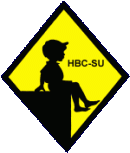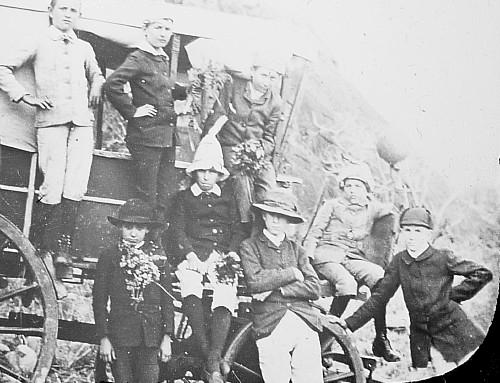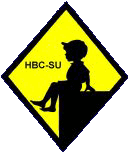
South African Schools: Chronology--The 1900s

Figure 1.--This is a Magic Lattern Slide taken around the time of the Bohr War, probbly before the War. It might be seen as British war propaganda. the caption was '33. Neglect of education'. It was perhaps meant to suggest that the Afrikaaners were poorly educated and not as civilized as the British. It was true that the Afrikaaners were generally not well educated, but the level of civilization is a whole different matter. The scene lookslike an Afrikaner get together of some kind, probably a chuurchbevent. Since the boys would be working on isolated farms, they enjoyed these events and the opportunity to get together with other boys their own age, The boys have arranged themselves on a typical Boer traveling wagon.
|
|
We do not know much about the South African schools in the early-20th century at this time. As far as we know there were no schools or the Africans, except mission schools, but we need more informatiin here. The English in the Cape Colony must have founded some schools. The British mostly lived in the cities and towns and there would have been schools there although we have few details. Presumably they would have been similar the the schools in Britain. The Bohrs moved out of Cape Colony to get away from the British Government, The Bohr War was raging at the beginning of the century. This devestated the Afrikaaner areas. The Boers were the descendents of the original Dutch settlers. Unlike the English, they had largely lost connection with the home country, other than language and religon. They moved further and further from the British Cape Colony and areas of of modern urban society. They were independent farmers and lived on isolated farm stads. They did not value education in the same way that the British and the Dutch in the Netherlands did. They just wanted the children educated so they could read and write. This was important because they were fervent Protestants and Bible study and Church was very important to them. But as the boys would be mostly working on farms, higher educated was seen as important. They had esentially the same attitude toward education as the Amish in America.
After the War, the economy in the Bohr areas began to develop beyond a farm economy.
HBC-SU

Related Chronolgy Pages in the Boys' Historical Web Site
[Main Chronology Page]
[The 1900s]
[The 1910s]
[The 1920s]
[The 1930s]
[The 1940s]
[The 1950s]
[The 1960s]
[The 1970s]
Navigate the Relate Boys Historical Clothing Style Pages
[Main South African country page]
[Long pants suits]
[Short pants suits]
[Lederhosen]
[Kneesocks]
[Eton suits]
[Jacket and trousers]
[Blazer
[School sandals]
Navigate the Boys' Historical Clothing School Uniform Pages
[Return to the South African school chronology20th century page]
[Return to the South African school chronology page]
[Return to the Main South African School Chronolgy Page]
[Return to the Main School Uniform Page]
[Return to the Main National School Uniform Page]
[Australia]
[England]
[France]
[Germany]
[Ireland]
[Italy]
[Japan]
[New Zealand]
[Poland]
[Scotland]
[United States]
Navigate the HBC School Pages
[Activities]
[Chronology]
[Clothing styles]
[Countries]
[Debate]
[Economics]
[Garment]
[Gender]
[Hair]
[History]
[Home trends]
[Literary characters]
[School types]
[Significance]
[Transport and travel
[Uniform regulations]
[Year level]
[Other topics]
[Images]
[Links]
[Registration]
[Tools]
[Return to the Historic Boys' School Home]
Created: 7:44 PM 8/18/2014
Last updated: 7:44 PM 8/18/2014




